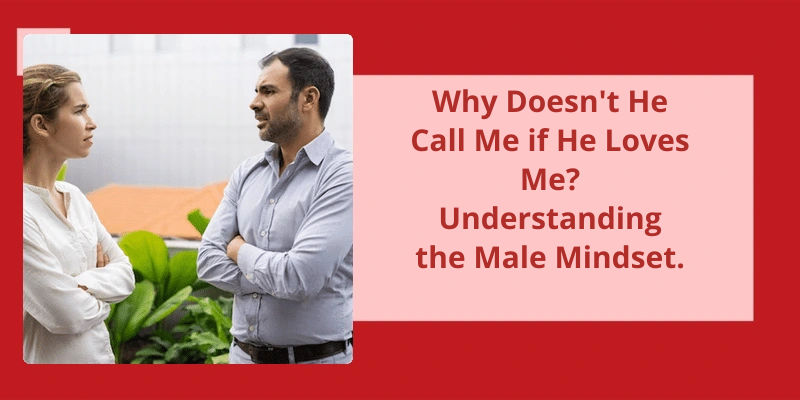When it comes to relationships, one of the most frustrating and confusing experiences that many women encounter is when guys simply don’t provide closure. It’s a phenomenon that’s been widely discussed and analyzed, with various theories and explanations put forth. While there may be no definitive answer as to why some guys choose not to provide closure, the reasons that have been explored and proven shed light on this perplexing behavior. By delving into these proven reasons, we can gain insight into this puzzling aspect of relationships and hopefully find ways to navigate it more effectively.
Do Guys Not Need Closure?
While it may seem like guys don’t need closure after a breakup, the truth is that everyone requires closure in some form or another. Contrary to popular belief, women aren’t the only ones who need time to process and deal with their emotions following a breakup. Both men and women share this fundamental need for closure.
Dr. Dardashti, a renowned relationship expert, emphasizes the universality of the need for closure. She explains that closure isn’t a gender-specific concept but rather a human one. Just like women, men also experience a range of emotions and require time and understanding to come to terms with the end of a relationship. It’s simply a matter of how individuals process and express their emotions that may differ.
It’s important to remember that closure doesn’t necessarily mean getting all the answers or hearing an explanation directly from the ex-partner. Closure can take many forms and may involve seeking clarity within oneself, finding support from friends and family, or engaging in therapy to process the emotions associated with the breakup.
Men might tend to display their need for closure differently than women due to societal expectations and gender norms. Society often encourages men to suppress their emotions and put on a tough facade, making it harder for them to express their feelings. Consequently, men might take longer to reach a place of closure or choose alternative outlets, such as distractions or engaging in new activities, to cope with their emotions.
The Benefits of Therapy in Helping Men Navigate the Emotions Associated With a Breakup
- Provides a safe and non-judgmental space to express and process emotions
- Offers constructive ways to cope with feelings of sadness, anger, and confusion
- Helps develop a better understanding of oneself and personal growth opportunities
- Assists in identifying unhealthy coping mechanisms and replacing them with healthier ones
- Encourages self-reflection and introspection to gain insights into past relationship patterns
- Supports the development of effective communication and emotional intelligence skills
- Empowers individuals to establish healthy boundaries and prioritize self-care
- Provides guidance and strategies for managing difficult emotions and moving forward
- Offers ongoing support and encouragement during the healing process
- Assists in building resilience and fostering personal growth after a breakup
It can be incredibly difficult when a partner decides to end a relationship without offering any closure. This lack of explanation can leave you feeling confused, hurt, and questioning what went wrong. Without a clear understanding of why they chose to walk away, it can be challenging to heal and move on. In this article, we will delve into the impact of not receiving closure in a relationship and explore different ways to find your own sense of understanding and closure.
Is It Bad to Not Give Closure?
Is it bad to not give closure? The concept of closure in a relationship is a complex and emotionally charged topic. When your partner decides to end the relationship without giving you closure, they rob you of your right to know the reason why they did it. As you aren’t the one who decided to break up, not getting closure in a relationship leaves you wondering what went wrong. It can leave you feeling confused, hurt, and even questioning your own worth. Closure allows us to gain a sense of understanding and acceptance of the situation, which is crucial for moving on and healing.
Without closure, it becomes challenging to truly move on and make peace with the end of the relationship. You might find yourself stuck in a loop of overthinking, replaying scenarios in your head, and endlessly speculating about what might have caused the breakup. This lack of closure can prevent you from fully healing and finding closure within yourself. It can also make it difficult to trust others in future relationships, as you may be left with unanswered questions and lingering doubts.
For some individuals, not having closure can feel like a rejection or a dismissal of their feelings and emotional needs. It can leave them feeling invalidated, as if their emotions and experiences don’t matter. This lack of closure can create a sense of unfinished business, making it harder to let go and move forward. It’s human nature to seek understanding and closure, and denying someone that can feel callous and unfair.
In addition, not giving closure can also perpetuate a cycle of unhealthy communication patterns. By avoiding difficult conversations and failing to provide closure, the other person may unintentionally reinforce negative relationship dynamics. It can prevent both parties from acknowledging their own shortcomings, learning from the experience, and growing as individuals.
Instead, they may choose to distance themselves or avoid difficult conversations altogether. Others might withhold closure out of fear, vulnerability, or a desire to protect themselves from potential guilt or confrontation. In these cases, it’s crucial to recognize that closure is ultimately something we can only find within ourselves, as opposed to relying on others to provide it.
Why Would Someone Not Give You Closure?
They may be emotionally detached or unwilling to engage in a difficult conversation because it forces them to confront their own actions and potentially feel guilty. Some people simply prioritize their own comfort over yours, and providing closure requires an uncomfortable level of vulnerability and honesty.
Additionally, individuals who struggle with communication skills may find it challenging to articulate their thoughts and feelings, especially when it comes to sensitive topics like ending a relationship. They may fear saying the wrong thing or making the situation worse, leading them to avoid the conversation altogether.
In some cases, individuals may also believe that giving closure will only prolong the pain and prevent both parties from moving on. They may think that it’s kinder to cut ties abruptly, rather than dragging out the process with explanations and discussions. This perspective may stem from a misguided belief that closure is unnecessary or even harmful.
Ultimately, it’s important to remember that receiving closure isn’t solely dependent on you. It requires the willingness and emotional capacity of the other person to provide it. If you find yourself in a situation where closure is lacking, it may be helpful to seek support from friends, family, or professionals who can help you navigate through your emotions and find closure within yourself.
Cultural Factors: Explore How Different Cultures or Societal Norms May Influence the Concept of Closure and Affect Someone’s Willingness to Provide It.
In some cultures or societal norms, the concept of closure may not be given as much importance as in others. This can affect someone’s willingness to provide closure, especially in romantic relationships. For instance, in certain cultures, there may be a belief that ending a relationship abruptly without any explanation is the norm, and providing closure may be seen as unnecessary or even confrontational.
Additionally, societal expectations and gender roles can also play a role in why guys may not give closure. In some societies, men may feel pressure to portray themselves as strong and silent, avoiding conversations that involve sharing emotions or discussing reasons for ending a relationship. This can make it more challenging for them to open up and provide closure to their partners.
It’s important to understand that these cultural factors aren’t applicable to all individuals or situations, and there are guys who do give closure. However, exploring these cultural influences can offer insights into why some guys may opt not to provide closure in certain circumstances.
No closure signifies a lack of consideration and empathy from someone who didn’t think you were deserving of a meaningful conversation. They didn’t prioritize the potential repercussions of their actions on your perception of them, the opinions of your friends, or the awkwardness that might arise from future encounters. Above all, they disregarded the vulnerability of your emotions, leaving your heart in a delicate state.
What Does Having No Closure Mean?
Having no closure can be an incredibly painful experience. It means that someone, for whatever reason, didnt value you enough to have an honest conversation with you about why things ended or why they’re choosing to walk away. It’s a sign that they didnt see you as important enough to give you the respect and consideration you deserved. Instead, they chose to leave you hanging, lost and confused, without any answers to help you make sense of the situation.
Furthermore, the absence of closure highlights how little regard they’d for your emotional well-being. They didnt take into account how fragile your heart was, how deeply you invested in the relationship, and how much you may have come to rely on their presence in your life. It’s a painful reminder that they didnt prioritize your feelings and chose to walk away without a second thought.
Conclusion
In conclusion, the topic of why guys don't give closure is a complex and multifaceted issue that can’t be reduced to a simple list of reasons. Understanding the nuances of human behavior, communication, and societal expectations are crucial in comprehending why this phenomenon occurs. The reasons behind a lack of closure may include fear of confrontation, a desire to avoid responsibility or discomfort, conflicting emotions, or a lack of emotional intelligence. It’s important to approach this subject with empathy and understanding, recognizing that individuals may have their own valid reasons for not providing closure. Ultimately, fostering open and honest communication is key in resolving these issues and ensuring healthy and fulfilling relationships for all parties involved.






